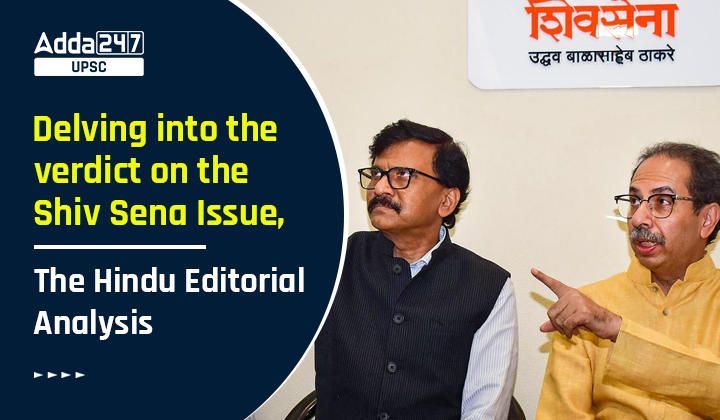Table of Contents
The Hindu Editorial Analysis: The Editorial Analysis of The Hindu Newspaper Editorial Articles aimed at simplifying various concepts relevant to the UPSC and other State PSC Exams. The Editorial Analysis helps in expanding the knowledge base as well as framing better quality mains answers. Today’s Hindu Editorial Analysis of ‘Delving into the Verdict on the Shiv Sena Issue’ discusses the Supreme Court of India’s judgment on the Shiv Sena issue and various associated issues of the judgement.
Supreme Court Judgement on Shiv Sena Issue
The Supreme Court of India’s verdict on the Shiv Sena issue is intriguing because both sides perceive it as favorable to their cause.
- The Chief Justice of India has reportedly provided a clear analysis of the issues and arrived at innovative conclusions.
- However, it is challenging for ordinary citizens to comprehend how each party views the legal statements in the judgment as advantageous.
- In this context, it is crucial to examine the verdict and ascertain the precise stance taken by the highest court of the country on the contentious matters presented before it.
SC Judgement on Floor Test
The Court strongly criticized the Maharashtra Governor’s decision to call for a floor test, deeming it illegal. The Court explicitly stated that the Governor, as a constitutional authority, should refrain from entangling themselves in internal party conflicts or disputes, both within a party or between parties.
- The supreme court said that the resignation of Uddhav Thackeray as Chief Minister before the floor test has effectively prevented the Court from restoring his Chief Minister-ship and thus doing complete justice in this case.
- But there is no doubt that the Governor was wrong in law in calling for the floor test.
Constitutionality of Inviting for Alternative Government
The Constitution Bench, however, finds no fault in the Governor’s decision to invite Eknath Shinde to form an alternative government, as it falls within the constitutional responsibilities of the Governor to explore such possibilities when the incumbent government collapses.
- But the action of the Governor in calling for a floor test which has been characterised as illegal by the Court, triggered the resignation of the Chief Minister.
- The fruit of this ‘illegality’ was the formation of an alternative government.
- It is rather naive to believe that the impact of that illegality evaporated the moment Uddhav Thackeray resigned.
Governor Not Inviting Opposition Party for Forming Government
In line with the universally acknowledged practice observed in democratic nations, when a government collapses, the constitutional head, be it the Governor or President, typically seeks to ascertain whether the leader of the Opposition can form a new government.
- However, in the case of Maharashtra, the Governor did not approach the leader of the Opposition in the Assembly to explore their potential for forming a government.
- Instead, the Governor selected a member from the Shiv Sena, the same party whose government had recently resigned, to establish the government.
- This action by the Governor indicated his active involvement in the internal party dispute within the Shiv Sena.
- The Court has clearly expressed that Governors should refrain from getting involved in internal party conflicts.
- However, in this case, the Court seemingly overlooks the ongoing consequences of the Governor’s “illegal” action of calling for the floor test when it approves the swearing-in of the Shinde government.
- The Supreme Court appears to have disregarded the ethical aspect of the entire process, resulting in a loss of moral coherence in the judgment.
SC Judgement on Validity of Whip
The question of disqualifying MLAs who defied the whip raises the fundamental issue of determining the validity of the whip itself. In this case, both factions within the Shiv Sena Party issued whips to all its members, resulting in reciprocal disqualification petitions. The Court rightfully emphasized that the initial decision on a disqualification petition should rest with the Speaker. Consequently, the matter of disqualification has been referred back to the Speaker.
- Within this context, a crucial question emerges: which faction’s whip is deemed valid?
- The Supreme Court explicitly stated in the judgment that it is the political party that possesses the authority to appoint the whip and the legislative party leader, rather than the legislative party itself.
- However, the judgment introduced unnecessary confusion by stating that a party split gives rise to two factions, with no single faction representing the entire party.
Conclusion
The judgment, by discussing factions and the Speaker’s role in determining the legitimate party, introduces a level of confusion. A more decisive stance by the Supreme Court, explicitly declaring Uddhav Thackeray’s party as the original political party with the authority to issue a valid whip, would have prevented the current state of confusion in Mumbai.
Anti-Defection Law- Disqualification of MLAs



 TSPSC Group 1 Question Paper 2024, Downl...
TSPSC Group 1 Question Paper 2024, Downl...
 TSPSC Group 1 Answer key 2024 Out, Downl...
TSPSC Group 1 Answer key 2024 Out, Downl...
 UPSC Prelims 2024 Question Paper, Downlo...
UPSC Prelims 2024 Question Paper, Downlo...




